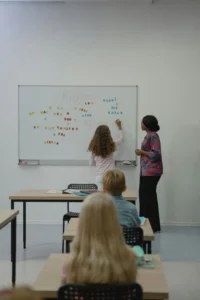Vero Beach, Florida / Syndication Cloud / September 26, 2025 / Christ Church Academy

Key Takeaways
- Christian preschools in Florida integrate faith naturally into daily activities through Bible stories, prayers, and character development, creating consistency between home and school values.
- The best Christian preschools balance emotional nurture with developmentally appropriate academic preparation through play-based learning rather than formal instruction.
- Teacher quality, program philosophy, and safety protocols represent the three most critical evaluation criteria when selecting a Christian preschool.
- Strategic school visits should include observing teacher-child interactions, asking targeted questions about faith integration, and assessing community values.
- Florida’s VPK program allows many Christian preschools to offer free prekindergarten education for 4-year-olds while maintaining their faith-based approach, though eligibility requirements apply.
Selecting the right Christian preschool represents one of the most significant educational decisions parents make for their young children. The choice influences not just academic readiness, but social development, emotional growth, and spiritual formation during crucial early years, says a Florida-based expert from Christ Church Academy.
For Florida families seeking to align their child’s early education with Christian values, understanding the unique benefits and evaluation criteria becomes vital for making an informed decision.
Why Christian Preschools Integrate Faith Into Daily Learning
Christian preschools distinguish themselves through intentional integration of faith throughout all aspects of the early childhood experience. Rather than treating spiritual development as a separate “religion class,” quality Christian programs weave faith naturally into everyday activities, conversations, and relationships.
Children experience faith through age-appropriate Bible stories brought to life through engaging activities, simple prayers incorporated throughout the day’s natural rhythms, and songs that reinforce biblical concepts. This integrated approach helps young children begin developing a coherent worldview where faith becomes part of their understanding of all aspects of life rather than a compartmentalized experience.
For families with Christian beliefs, faith-based preschools create valuable alignment between home and school environments. This consistency reinforces family values and reduces confusion that can arise when children receive conflicting messages from different authority figures.
Christian preschools typically foster close-knit communities where families share common values and commitments. This community aspect provides supportive relationships with other parents navigating similar challenges, teachers who see their work as ministry, and resources for addressing difficult topics from a faith perspective. The community dimension extends the preschool’s impact beyond the child to benefit the entire family unit.
Key Evaluation Criteria for Christian Preschools
When evaluating Christian preschools, three fundamental criteria determine program quality and family fit. Each factor contributes significantly to the overall educational experience and long-term outcomes for young learners.
1. Teacher Quality and Credentials
Research consistently identifies teacher quality as the most significant factor in early childhood program excellence. Florida’s VPK program generally requires teachers to have at least a Child Development Associate (CDA) degree or equivalent credential, though specific qualifications may vary, establishing baseline standards across participating schools.
Outstanding Christian preschool teachers combine educational credentials with genuine faith commitment and natural warmth with children. Look for educators who demonstrate ongoing professional development, experience with young children, and strong communication skills with both students and parents. A multi-generational teaching approach often proves particularly beneficial, blending youthful enthusiasm with seasoned wisdom.
2. Program Philosophy and Curriculum Approach
Different Christian preschools operate from various educational philosophies, each providing distinct advantages. Some emphasize play-based learning that develops pre-reading and pre-math concepts through hands-on experiences, while others incorporate structured approaches like Montessori or traditional methods.
Many Florida Christian preschools utilize specialized curricula that emphasize character-building and spiritual growth while meeting state educational standards. Programs participating in Florida’s VPK system follow the Florida Early Learning and Developmental Standards for Four-Year-Olds, ensuring kindergarten readiness alongside faith development. The ideal program maintains developmentally appropriate practices with a coherent philosophy guiding daily activities.
3. Physical Environment and Safety Protocols
The preschool’s physical setting significantly impacts children’s daily experiences and overall safety. Quality Christian preschools maintain clean, well-organized facilities with age-appropriate materials and equipment that support both active play and quieter learning activities.
Safety represents a non-negotiable factor requiring proper teacher-to-child ratios, staff trained in pediatric first aid and CPR, clear illness policies, and secure check-in procedures. The physical environment should display children’s work respectfully while providing adequate indoor and outdoor spaces for diverse activities. Evidence of Christian themes integrated naturally into classroom displays and materials demonstrates thoughtful faith integration.
Creating the Right Balance Between Nurture and Academics
One of the most significant considerations in Christian preschool selection involves finding the optimal balance between emotional nurture and academic readiness. Different programs place varying emphasis on these elements, making understanding your child’s specific developmental needs important.
Signs of a Nurturing Christian Environment
Research in child development consistently emphasizes that emotional security forms the necessary foundation for all other learning. Children who feel safe, valued, and connected are primed for cognitive development in ways that stressed or anxious children cannot achieve.
Quality nurturing environments feature warm, responsive teacher-child interactions where educators get down at children’s eye level, respond with empathy to upset children, and celebrate accomplishments genuinely. Teachers model Christ’s love through consistent caregiving, gentle guidance approaches to behavior challenges, and regular communication with parents about children’s experiences. Physical affection appropriate to individual children’s needs and preferences creates additional security.
Developmentally Appropriate Academic Preparation
While emotional nurture provides the foundation, appropriate academic preparation remains important for kindergarten readiness. However, effective preschool learning looks dramatically different from educational approaches designed for older children.
Developmentally appropriate academic preparation emphasizes learning through hands-on experiences rather than worksheets, play-based activities that develop pre-reading and pre-math concepts, and language-rich environments featuring quality children’s literature. Activities focus on developing fine motor skills needed for writing, critical thinking, problem-solving abilities, and positive approaches to learning, including curiosity and persistence. Studies show that play-based approaches to early literacy and mathematics produce stronger long-term academic outcomes than highly structured programs.
Strategic School Visit and Evaluation Process
Making an informed Christian preschool decision requires a systematic evaluation process beginning months before enrollment. Strategic visits provide insights beyond what websites and brochures can communicate.
1. Prepare Targeted Questions About Faith Integration
Come prepared with specific questions addressing your family’s priorities regarding faith development. Key inquiries should address how Christian faith is integrated throughout daily activities, what Bible curriculum or resources the program uses, and how teachers support children’s spiritual development regardless of family background.
Ask about the faith backgrounds teachers bring to their work and how the program approaches families from diverse spiritual backgrounds. Understanding whether the school pressures families toward specific religious practices or maintains respectful relationships with those at various points in their faith journey helps determine compatibility with your family’s needs.
2. Observe Teacher-Child Interactions Using Assessment Standards
During visits, pay careful attention to how teachers interact with students throughout natural classroom activities. Quality interactions include teachers responding warmly to children’s questions, providing individual attention during group activities, and managing behavioral challenges with patience and respect.
Look for evidence that teachers know individual children well, remember their interests and preferences, and adjust their approach based on each child’s temperament and needs. Observe whether children appear comfortable approaching teachers for help and whether the overall classroom atmosphere feels joyful and engaging rather than stressful or overly controlled.
3. Assess Community Values and Family Support
Evaluate the broader school community’s alignment with your family’s values and expectations. This includes understanding opportunities for parent involvement, communication practices between school and home, and resources provided to support faith development beyond the classroom.
Ask current families about their experiences with the school community, including how conflicts are resolved, how diverse perspectives are handled, and what support systems exist during challenging times. The strength of community relationships often determines long-term satisfaction with the preschool choice.
Anglican Schools and Early Learning
Anglican schools combine regular subjects with religious teaching from preschool through middle school. These schools focus on helping children grow in many ways: spiritually, emotionally, socially, and academically.
Research shows that students who stay in faith-based schools from early years through elementary often do well in their studies. Many Anglican schools earn approval from groups like Christian Schools of Florida. They also connect families with their local communities for support beyond school.
For Florida families looking to enroll their child in a Christian preschool that provides both nurturing care and academic preparation within a faith-centered community, Christ Church Academy provides Anglican education developed to support each child’s unique developmental journey.
Christ Church Academy
665 20th Street
Vero Beach
Florida
32960
United States















